Newsletter
Weibo Watch: The Paris Syndrome
Post-pandemic travel disillusionment to the ‘Unkillable One from Shijiazhuang’, an overview of noteworthy and trending topics on Weibo and beyond.
Published
12 months agoon

PREMIUM NEWSLETTER | ISSUE #11
This week’s newsletter:
◼︎ 1. Editor’s Note – The Paris Syndrome hits close to home
◼︎ 2. What’s Trending – A closer look at the featured stories
◼︎ 3. What to Know – Highlighting 8 hot topics
◼︎ 4. What Lies Behind – Raincheck for next week!
◼︎ 5. What’s Noteworthy – Rumored fall of Zhongzhi Enterprise
◼︎ 6. What’s Popular – How the TFBoys boosted Xi’an economy
◼︎ 7. What’s Memorable – Looking back: Swedish Chinese tourist gate
◼︎ 8. Weibo Word of the Week – “The Unkillable One from Shijiazhuang”
Dear Reader,
Half a year after China reopened its borders and around four months after resuming the issuance of tourist visas, there is much discussion surrounding the low number of foreign tourists traveling to China. The proportion of tourists from Europe, the U.S., Japan, and South Korea has significantly dropped.
As more incentives are introduced that might attract more inbound international visitors, such as making it easier for some foreigners to obtain visas upon arrival and letting travelers link their Visa and Mastercard accounts to Alipay and WeChat Pay, many still argue that there are numerous issues hindering smooth travel in China for foreign visitors. A recent report by Wall Street Journal suggested that visitors are staying away because of deteriorating relations between China and the West, but recent viral Twitter posts also highlighted practical reasons, including troublesome visa processes, challenges with digital payments in a cashless society, the Great Firewall, certain hotels not accepting foreign guests, and difficulties encountered when services require Chinese ID cards.
While closely following these tweets, we’ve also noticed a trend on Chinese social media regarding outbound travel to Europe during the same period. Earlier news reports had already mentioned that Europe is experiencing lower-than-expected bookings from high-spending Chinese travelers, and the anticipated ‘Chinese travel boom’ hasn’t materialized. For most Chinese citizens, traveling abroad has become difficult (securing visa appointments for some destinations is almost like a lottery) and more costly. Simultaneously, domestic tourism has become more popular and attractive than ever before, making Chinese holidays a preferred choice.
Consequently, those travelers who finally reached their destinations in Europe recently might have overcome some considerable obstacles to get there. But a recent surge in Europe-related posts within China’s travel-focused social media sphere indicates that for many Chinese travelers, their European adventures turn out to be quite underwhelming.
The phenomenon known as ‘Paris Syndrome’ describes the sense of extreme disappointment some individuals feel when visiting Paris, finding that the city doesn’t match their expectations due to the reality not aligning with the romanticized scenes from movies. While the term originated in the 1980s, typically applying to Japanese tourists experiencing culture shock in Europe, many recent accounts from Chinese travelers also express disillusionment with their European experiences.
Why? The most frequently mentioned reason is that they view Europe as “messy,” “chaotic,” and deficient in public safety to the point that travelers caution each other against going out at night. Many posts on social media recount incidents of theft in cities such as Paris, Amsterdam, Barcelona, and Rome, leaving individuals feeling helpless when they discover that the police couldn’t provide sufficient assistance. Some have even shared experiences of being robbed twice during a single trip, leaving them fearful and disheartened. As a result, Chinese popular Xiaohongshu app is filled with guides and tips on “how not to get robbed in Europe,” recommending special safety bags, hotel room locks, and additional luggage protection. However, some commenters suggest that the joy of traveling is ruined for them if going to European cities means one must prepare to be vigilant at all times and assume that “thieves are all around.”
Observing frustrated international travelers’ Twitter posts in China and the emotional posts from Chinese travelers in Europe, it seems that many of us are experiencing some form of the ‘Paris Syndrome’ recently. Especially during the Covid years, we built up our hopes about that one big trip we were going to make – surely it was going to be the best trip of a lifetime? But we get pickpocketed, we get denied at hotels, we get lost in translation, and we inescapably get disappointed.
Just recently, atop an ancient Chinese pagoda in Zibo, I shared tea for two with another solo traveler – a young teacher from northern China. As I mentioned being from Europe, he shared his hesitation about going there: “I’ve been hearing how unsafe it is for Chinese recently.” After an enlightening conversation, he confided that I was the first foreigner he had ever spoken to. Later, on another train, I received a message from an old friend in Paris who had seen one of my travel photos. He wrote: “You’re traveling in China all alone now? I’ve been hearing how unsafe it is for foreigners recently.”
An upside amidst the negative travel news regarding both Europe and China is that our expectations are lowered. Perhaps we can avoid the Paris Syndrome by venturing out ourselves and discovering that the rewards of travel are usually more meaningful than the disappointments. Breaking barriers and cultural distances entails getting closer to each other – quite literally. So, I expressed my hope to the young teacher I met in Zibo, that he would still decide to explore Europe. Similarly, I hope that China will be able to welcome more international visitors in the near future.
Read more about Chinese travelers’ experiences in Europe in our latest featured post. Zilan Qian and Ruixin Zhang contributed to this newsletter. If you’re still heading out this summer, I wish you happy, safe travels and meaningful experiences.
Best,
Manya (@manyapan)
What’s Trending
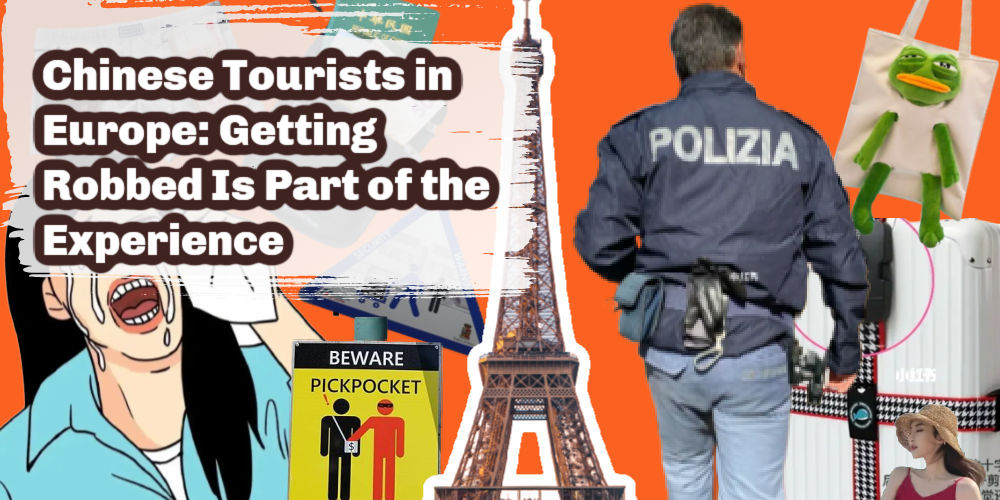
1: Chinese Robbed in Europe | My bag was stolen in Amsterdam, my phone was snatched in Paris, and my camera was robbed in Rome. Chinese social media is brimming with accounts from Chinese travelers sharing their unfortunate experiences of falling prey to theft during their trips to Europe. Getting robbed in Europe has become so common that Chinese apps like Xiaohongshu and Douyin are now flooded with numerous “Europe Anti-Theft Strategies” and “How Not To Get Robbed in Europe” guides.
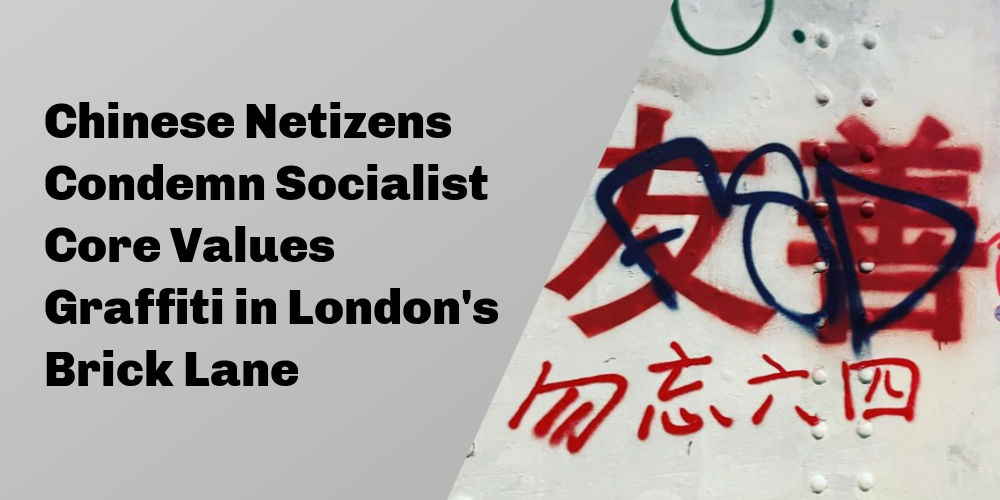
2: Brick Lane Graffiti | In London’s Brick Lane, a wall covered with Chinese slogan graffiti sparked backlash from local art communities and Chinese diaspora recently, with many perceiving the graffiti as a show of support for the Chinese Communist Party. While some voices in China’s social media sphere defended the graffiti, many others condemned the makers for being disrespectiful and arrogant.

3: Milky-Spicy Trend | Some parents think it’s cute, others think it is funny. Dressing children in tight dresses and grown-up attire has evolved into a trend that is mostly visible on Chinese social media. An entire online economy has developed around the ‘Milky-Spicy Trend,’ which is embraced by some parents highlighting its innocence while disregarding potential negative consequences. But recently, Chinese media outlets and social media commenters are pointing out the dangers behind the trend.
What to Know

Haohuanluo noodles have made it to space.
◼︎ 1. China’s among Countries with Lowest Birth Rates. The problem of China’s super low birth rates is not going to solve itself any time soon. A renowned professor of demography, Yuan Xin, made headlines this week for pointing out that China has become one of the countries with the lowest birth rates globally, projecting that China’s negative population growth will continue well into the 2070s. China’s expected number of birth rates for 2023 is 7-8 million, which is another record low. Just 12 million babies were born in 2020 (8.5 births per thousand), 10.6 million babies were born in 2021, and the latest number, published in January 2023, indicated that 9.56 million people were born, while 10.41 million died. 2023 would therefore see the lowest birthrate yet. (Various related trending hashtags on Weibo, one of them being ‘China Now among Countries With Lowest Birth Rates Globally’ #中国已成为全球生育率最低的国家之一#, 200 million views).
◼︎ 2. Xi’an Flash Floods. The village of Weixiping, Xi’an, saw a huge mudslide and flash flood on August 11, triggered by heavy rain. Local authorities set up a major rescue campaign, involving nearly 1000 team members including search & rescue experts and firefighters. According to the latest reports, 21 people died and 6 people are still missing. (Weibo hashtag “21 People Confirmed Dead in Xi’an Mud Slides” #西安泥石流已发现21名遇难者#, 5.8 million clicks; “Still 6 People Passing after Xi’an Landslide #西安泥石流灾害仍有6人失联#, 28+ million clicks).
◼︎ 3. Third Covid Wave. There has been a surge in social media posts this week about Covid infections and a third Covid wave in China. While one after the other posts photos online of their positive tests, one popular comment on Weibo said: “I’ve never had Covid yet, can you believe it?!” (Weibo hashtag “People Testing Postive for Covid for 3rd Time Emerging One by One” #
#新冠三阳的人开始陆续出现##, 450 million clicks)
◼︎ 4. Health Care Corruption Campaign. Recently, China had intensified its crack down on corruption in the health care system, triggering many discussions this week. The campaign, which aims to restore public trust in the medical sector after the pandemic, has already resulted in 168 hospital bosses being nabbed, as reported by South China Morning Post on Sunday. The newspaper further reported that at least two major pharmaceutical firm executives are now under investigation. We’ll report more on this topic as it keeps fermenting online. (Hashtag “Pharmaceutical Representatives Bribing Doctors” #医药代表性贿赂医生#, 520 million views).
◼︎ 5. Hebei Floods Aftermath. The aftermath of the devastating floods in Hebei has remained a prominent topic of discussion this week. For those affected, this might be the most challenging period as some return to find their homes in ruins. As the affected individuals strive to recover, heartening stories on social media showcase people coming together to provide support during this crucial time. For example, those local businesses going the extra mile to supply local schools with new books, or the supermarket in Zhuozhou that’s offering credit for purchases. According to the latest reports, Hebei may need two years to carry out post-flood reconstruction. (Various hashtags).
◼︎ 6. China’s Booming Vehicle Export. This week, reports surfaced that in the first half of 2023, China has overtaken Japan to become the world’s leading vehicle exporter. According to the China Association of Automobile Manufacturers, Chinese auto manufacturers exported 2.34 million vehicles globally from January to June, marking an impressive year-on-year increase of nearly 77 percent. (Various related hashtags, including “China World’s Biggest Exporter of Automobiles in First Half of 2023” #中国半年度汽车出口量居世界第一#, 480,000 views.)
◼︎ 7. Noodle Rocket. Haohuanluo (好欢螺) Snail Noodles, a famous Chinese noodle brand, successfully launched commercial rocket Ceres 1 on August 10 from the Jiuquan Satellite Launch Center in northwestern China’s Gobi Desert, sending seven satellites into planned orbit. Obviously, it was not actually the noodle brand that launched it, but sponsored it, although its social media campaign would make you believe otherwise, with many netizens being surprised that their fav noodle brand made it to space. (Hashtag “Successful Launch of the Haohuanluo Rocket” #好欢螺号火箭发射成功#, 250 million clicks).
◼︎ 8. Return of the Tour Groups. While Chinese tour group trips had already resumed to certain countries in the post-zero-Covid era, China’s Ministry of Tourism made an announcement on August 10th, stating that the resumption of tour groups to additional countries and regions will take place. This now encompasses countries such as Japan and the US, broadening the spectrum of foreign destinations from 60 to 138. The Ministry also reminded outbound tourists to be well-prepared before each journey – which might include checking up on those ‘how not to get robbed in Europe’ guides!
What’s Noteworthy
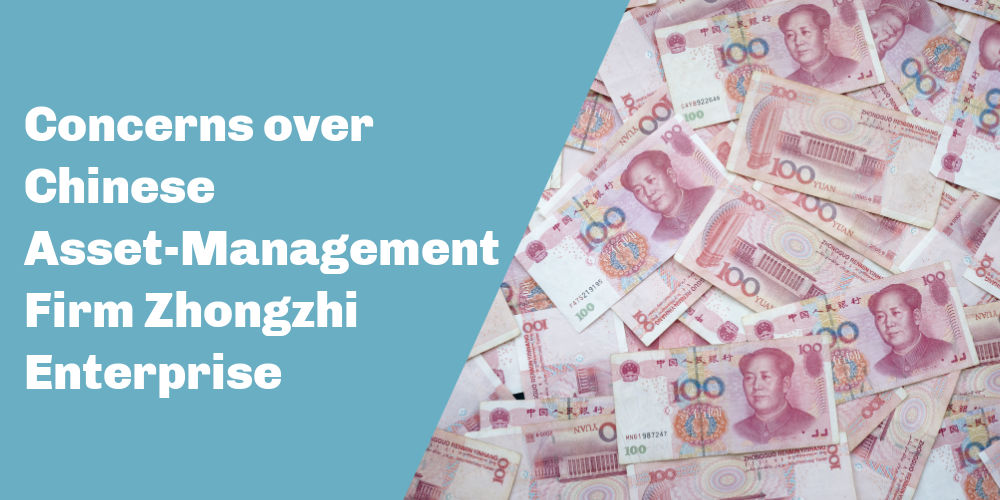
Photo by Eric Prouzet
Rumored Collapse of Zhongzhi Enterprise Group |
Recently, a financial advisor from the third-party wealth management company Hengtian Wealth made a public admission about a potential financial crisis which is said to have unfolded after the Chinese asset management firm Zhongzhi Enterprise Group allegdly failed to meet its loan repayment obligations, affecting around 150,000 individual investors who had collectively invested over 3 million RMB (approximately 416,000 USD). The crisis is estimated to involve a staggering amount of 230 billion RMB (about 32 billion USD), and the largest investment by a single client exceeded 5 billion RMB (approximately 692 million USD).
These rumors sparked concerns in the financial world, triggering strong reactions from both investors and the general public. Meanwhile, the Zhongzhi Group has halted all fundraising and repayment activities. Once a trillion-dollar empire built over decades, the Zhongzhi Group, which controls Zhongrong International and a handful of listed companies, now faces a potential collapse, representing a stunning downfall for a previously respected financial institution.
In response, many netizens have commented with the phrase “poverty spared me from a disaster” (“贫穷使我逃过一劫”), as most investment thresholds start at 3 million RMB (416,000 USD), which they could not afford. While the default might temporarily spare most individuals, some netizens have pointed out that the dynamics playing out among the wealthy could ultimately harm those at the bottom. As of now, there has been no official confirmation from Zhongzhi regarding the widely circulated information. Discussions surrounding this matter on Weibo have been subject to censorship, with numerous netizens reporting instances of their posts being flagged by the company and subsequently removed.
What’s Popular
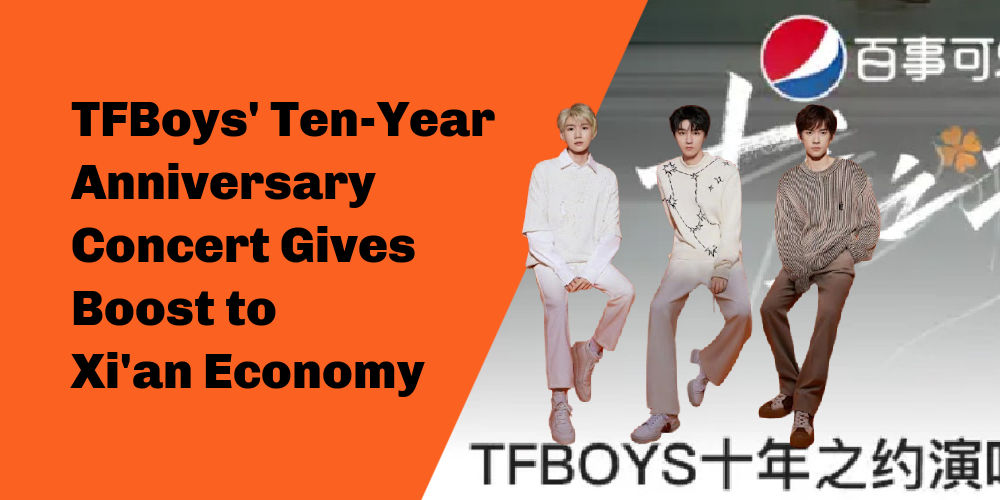
TFBoys Concert Rocks Xi’an | You might remember from our last Weibo Watch newsletter that the immensely popular Chinese pop group, TFBoys, created quite a stir within their fan community when they initially released tickets for their two-hour concert in Xi’an on August 6th, marking the band’s ten-year anniversary and their first live show since 2020.
The event unfolded with a certain degree of chaos and disorder (with reports of fainting fans and overwhelmed security personnel). However, recent news reports suggest that the concert has brought about numerous positive impacts for Xi’an, delivering a significant boost to the local economy. The revenue generated from ticket sales amounted to a staggering 35.76 million yuan (almost 5 million USD), consequently propelling the city’s tourism revenue to an impressive 416 million yuan (57 million USD).
In comparison to the same period in the preceding year, online bookings for accommodations in Xi’an surged by an impressive 738%. Notably, almost half of the TFBoys’ fans not only attended the concert but also took the opportunity to explore some of Xi’an’s scenic attractions. The fact that a single concert can trigger such a significant increase in tourism revenue underscores the triumph of the TFBoys. Debuting as one of China’s pioneering boy bands, the trio’s popularity remains steadfast and impactful.
What’s Memorable
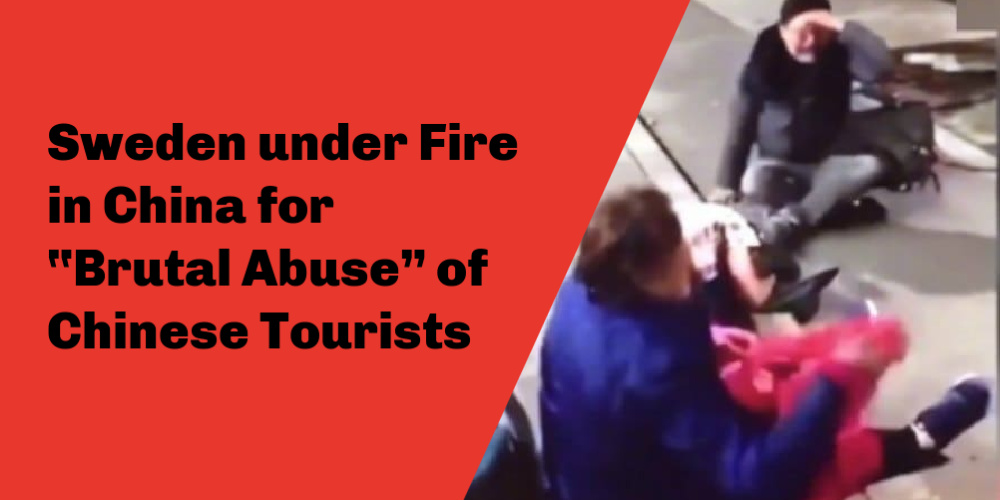
“This is killing!” incident | We already touched upon the ‘Paris Syndrome’ phenomenon in this newsletter, but the Sweden incident took things a step further – we might even liken it to a Stockholm Syndrome if the term weren’t already associated with something else. This incident became one of the most prominent topics on Chinese social media in 2018: the alleged mistreatment of a Chinese family in Stockholm during September ’18 ignited major discussions on Chinese social media, and even led to the Chinese Embassy in Sweden issuing a safety alert for Chinese tourists visiting the country.
The incident made headlines after bystander videos were posted on Chinese social media showing how a Chinese man was dragged out of a hotel by Swedish police, screaming “This is killing, this is killing!” It later showed his family members crying on the street outside of the hotel. Despite the family’s initial assertion of being subjected to severe mistreatment by the hotel without any valid cause, subsequent information revealed that the Chinese tourists had arrived significantly ahead of the designated check-in time and had chosen to remain in the hotel lobby. Nonetheless, this incident escalated to such an extent that it triggered a diplomatic dispute between Sweden and China.
Weibo Word of the Week
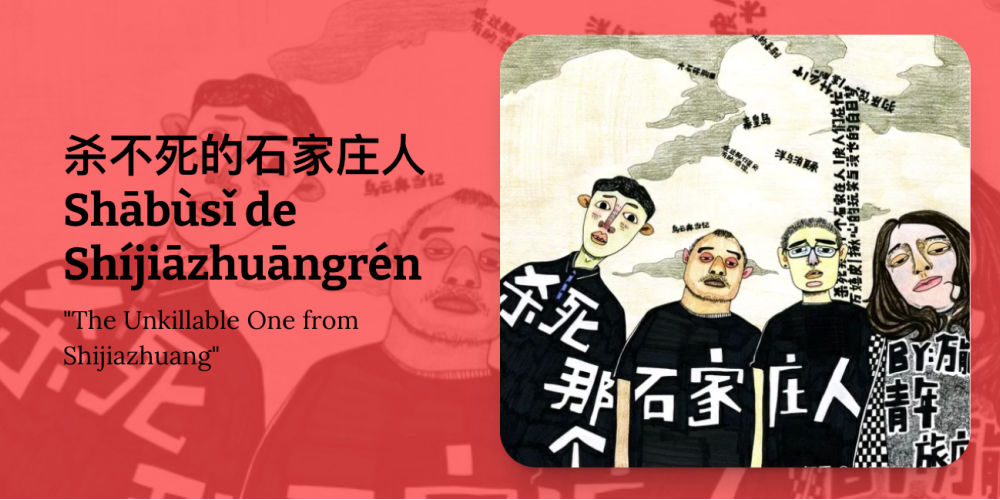
“The Unkillable Shijiazhuang Guy” | Our Weibo Word of the Week is actually a phrase this time, namely 杀不死的石家庄人 (shābùsǐ de Shíjiāzhuāngrén), which translates to “The Unkillable One from Shijiazhuang.” This phrase has gained popularity among netizens recently as a way to express sarcasm.
Shijiazhuang serves as the capital and the most populous city of China’s Hebei Province. “The Unkillable One from Shijiazhuang” (杀不死的石家庄人) is actually a song released in 2022 by the local Hebei Communist Youth League. It serves as a ‘harmonious’ reinterpretation of the renowned 2010 Chinese song “Kill the One from Shijiazhuang” (杀死那个石家庄人) by the Chinese rock band Omnipotent Youth Society. The original song, which delved into the consequences of the planned economy in northern China and the turbulence stemming from widespread job losses, deeply resonated as a shared memory among an entire Chinese generation.
The adapted song title has since been employed by Chinese netizens to express sarcasm, partly poking fun at the Communist Youth League’s attempt to revise a song that once conveyed hardship into one echoing state propaganda. The song’s renewed attention stems from Shijiazhuang’s recent declaration to transform itself into a “Rock N Roll Center,” adopting the slogan “The Unkillable Shijiazhuang.”
This move has been met with an incredulous response from the public, leading to a surge of imaginative adaptations online. These creative reinterpretations humorously reflect individuals’ resilience within a constrained cultural and social environment – a skillful form of self-deprecating expression. As one netizen eloquently summed it up: the previous generation experienced unemployment, the current generation is grappling with it, access to esteemed universities became harder, and now even our city’s anthem has been altered. Despite it all, I continue to reside in Shijiazhuang – this is the true essence of being “the unkillable one from Shijiazhuang!”
This is an on-site version of the Weibo Watch newsletter by What’s on Weibo. Missed last week’s newsletter? Find it here. If you are already subscribed to What’s on Weibo but are not yet receiving this newsletter in your inbox, please contact us directly to let us know.
Stories that are authored by the What's on Weibo Team are the stories that multiple authors contributed to. Please check the names at the end of the articles to see who the authors are.

Newsletter
Weibo Watch: The Future is Here
The future is here, but it looks different than we expected. This Weibo Watch covers driverless taxis and other noteworthy, popular topics.
Published
4 days agoon
July 23, 2024
PREMIUM NEWSLETTER | ISSUE #33
This week’s newsletter:
◼︎ 1. Editor’s Note – The future is here
◼︎ 2. What’s New and Noteworthy – A closer look at the featured stories
◼︎ 3. What’s Trending – Hot highlights
◼︎ 4. What’s Remarkable – A panicked mum goes to extremes
◼︎ 6. What’s Popular – The passing of Cheng Peipei
◼︎ 7. What’s Memorable – Virtual news anchors
◼︎ 8. Weibo Word of the Week – Bye bye, Biden
Dear Reader,
The future is here, and it is all unfolding so much differently than we could have imagined.
Scrolling through Douyin and Weibo’s video feeds recently, there are hundreds of videos about China’s self-driving taxi revolution. The wonder and excitement over the unmanned cabs is not surprising – it is the biggest thing happening in China’s taxi industry since ride-hailing apps Didi, Kuaidi, and Uber first entered the Chinese market over a decade ago.
Luobo Kuaipao (萝卜快跑) by Baidu, called ‘Apollo Go’ in English, is the ‘robotaxi’ ride-hailing platform that is now generating the most attention online. The concept is simple: customers order the taxi via the app and enter their destination, it arrives at the meeting point, and via a panel on the side of the car, the customer inserts the last four digits of their phone number. The door then automatically opens, and they can get in the car, which will take them to where they want to go. The car is private, and the price is comparable to ride-sharing fees, but then cheaper.
There is an additional benefit: the cars are equipped with a “smart cockpit”, allowing passengers to start their journey by tapping the screen in front of them, selecting a podcast or their favorite music, controlling the air-conditioning, and watching the traffic while en route.
Currently, Luobo Kuaipao has some 500 robotaxis operating without safety drivers in Wuhan, now the world’s largest city for driverless taxis. Baidu plans to expand this fleet with an additional 1,000 robotaxis soon. Shanghai will also launch a public testing program for driverless taxi services by SAIC in the upcoming week.1
Across China, at least 16 cities are now testing self-driving vehicles, with at least 19 Chinese car manufacturers competing for global leadership. Nationwide, 20 provinces have already released policies and regulations for autonomous driving.23
In many bigger Chinese cities, smart autonomous vehicles are already part of daily life. For years now, autonomous cleaning cars have been a common sight in popular tourist spots. I remember seeing a cute little car working hard to clean the area around the Terracotta Warrior museum in Xi’an in 2019. There are also self-driving tourist shuttles, driverless trucks operating between Beijing and Tianjin, and AI-driven service carts that precisely know where crowds gather during lunch breaks, stop when people wave, and process mobile payments for hamburgers or chicken salads on the spot.
So far, so ‘futuristic.’
But it’s not all roses. Besides the many enthusiastic videos taken by Chinese riders posting their experiences of taking an unmanned, self-driving taxi for the very first time, the emergence and rising popularity of robotaxis is also leading to worries, complaints, and aggravation.
A commonly heard objection to the unmanned taxis is that they are taking away jobs in the taxi industry. Perhaps even more so than when ChatGPT first emerged, the question of AI replacing people rather than serving them is frequently popping up, with taxi drivers fearing they’ll lose their jobs as robotaxis spread throughout China. These worries can still be countered by the numbers. After all, Wuhan has more than 100,000 registered ride-hailing cars, and Luobo Kuaipao holds just around 0.40% of the market – an insignificant number. 4 But with the rise of the industry, including its competitive prices, that number is bound to change.
Another far more unexpected concern about the rise of China’s robotaxis is that they’re causing chaos in the streets by being ‘too polite.’ These autonomous taxis are trained to follow the traffic rules and act civilized in traffic – something that seems out of place in some areas, where not following the rules almost seems like a rule.
By staying in the right lane, stopping for red lights, and giving priority to other cars, pedestrians, and animals, Chinese robotaxis are causing road congestion and sometimes accidents. They often struggle with complex traffic situations; for example, a viral video showed two Luobo Kuaipao cars waiting for each other to move, holding up traffic. In Wuhan, where drivers are known for their aggressive driving style, these autonomous cars face additional challenges. They strictly follow traffic laws and are not accustomed to pushing their way into traffic, which can lead to long waits for simple turns or merges, causing delays for other drivers.
This behavior has earned them the nickname ‘Sháo Luóbo’ (勺萝卜, “silly radish”), suggesting they are sluggish, or dumb. Although Luobo Kuaipao translates to ‘Radish Runs Fast’ or ‘Carrot Run,’ implying speed and efficiency, the reality is quite different.
Also unexpected is how ‘driverless’ is not what you might have thought it is; because every car still has a “safety operator” who is remotely monitoring it from another location. One person can monitor 10 cars or even more, but they’re allegedly penalized if they close their eyes for more than three seconds.5 Videos and pictures from these robotaxi headquarters sometimes look like old-fashioned game halls or internet cafes.
Complaints about Luobo Kuaipao not being as modern as people hoped and not being as assertive as they thought ultimately boil down to a clash of cultures. Luobo Kuaipao is made in China, but it’s not programmed with the personality and ways of a Wuhan taxi driver. In the end, Wuhan drivers will need to learn from Luobo Kuaipao, and Luobo Kuaipao will need to learn from Wuhan traffic. One side will learn to become more ‘polite,’ while the other will need to add some ‘aggression’ in order to mix in with traffic.
As ‘silly’ as Luobo Kuaipao may seem now, let’s not forget that everything starts small – we all began in diapers. Nothing significant ever came without humble beginnings. The future is here, but what we consider truly ‘futuristic’ will perhaps always be a vision for the days to come.
Miranda Barnes and Ruixin Zhang have contributed to the compilation and interpretation of some topics featured in this week’s newsletter. As always, if you have any observations or ideas you’d like to share, please don’t hesitate to reach out to me.
Best,
Manya Koetse
(@manyapan)
References:
1 Wu Qingqing 吴青青. 2024. “The Luobo Kuaipao Versus Tesla War”[萝卜快跑,与特斯拉终有一战].” Auto Business Review (汽车商业评论), July 18 https://inabr.com/news/19693 [Accessed July 22, 2024].
2 Bradsher, Keith. 2014. “China Is Testing More Driverless Cars Than Any Other Country.” New York Times, June 14 https://www.nytimes.com/2024/06/13/business/china-driverless-cars.html [Accessed July 22, 2024].
3 Qi Xu 齐旭. 2024. “Which City is China’s First City for Autonomous Driving? [谁是中国自动驾驶“第一城”?]” China Electronics News 中国电子报, July 16 https://new.qq.com/rain/a/20240716A00W2N00?suid=&media_id= [Accessed July 22, 2024].
4 Wu Qingqing 吴青青. “The Luobo Kuaipao Versus Tesla War.”
5 Jones, Phil. 2014. “Behind Driverless Cars – The Safety Operators Who Can’t Close Their Eyes[无人驾驶车背后,是无法闭眼的安全员].” The Paper, July 19 https://m.thepaper.cn/newsDetail_forward_28124126 [Accessed July 22, 2024].
What’s New

“As smooth as a flying bullet” | The assassination attempt on former US President Trump at a Pennsylvania campaign event also became a major topic on Chinese social media, where Trump’s swift reaction and defiant gesture after the shooting have not only sparked discussions but also fueled the “Comrade Trump” meme machine.

Park with a view | “The ‘sea in Ditan Park’ is a perfect example of how Xiaohongshu netizens use their imagination to change the world,” a recent viral post on Weibo said. This seaview spot in the Beijing public park has become a new ‘check-in spot’ among Chinese Xiaohongshu users and influencers.

From Hollywood to Beijing | For the Dutch national broadcaster’s summer series ‘From Hollywood to Bollywood,’ I spoke about the Chinese blockbuster Battle at Lake Changjin (2021) this week. This spectacular war film depicts the story of Chinese troops during the massive Battle of the Chosin Reservoir in the Korean War, where they encircled and pushed back American forces. The film is an impressive visual spectacle, but it’s a landmark movie in other aspects as well. Under the leadership of President Xi Jinping, China is striving to become a global powerhouse in the film industry. At the same time, this film also helped shape new narratives of the Korean War that foster patriotism. Dutch readers can listen to or watch the entire conversation via the link. If you’re interested in learning more about this topic but not that good at understanding Dutch—nobody’s blaming you—check out this article on WoW from our archive.
What’s Trending
JULY 11
🛢️🍳 Cooking Oil Scandal | A major news topic that’s been fermenting over the past month is the revelation that some cooking oil transport trucks in China are also being used for transporting industrial oil. The issue went trending after a publication by Beijing News authored by investigative journalist Han Futao (韩福涛) on July 2, which detailed how the same tanks were used for transporting both edible oils like soybean oil and chemical oils like kerosene without any cleaning process. The food safety scandal sparked outrage online and led to people meticulously tracking the whereabouts of oil tankers and how they operate, while various tanker companies came forward to provide clarity on their procedures. The incident has raised significant awareness about the potential misuse of tankers and intensified concerns about food safety in China.
JULY 15
🚗 Trump Photo Copyrights | After the Trump rally shooting went viral across Chinese media, another trending hashtag emerged regarding the copyright of the iconic ‘raised fist photo,’ shot by award-winning photographer Evan Vucci. Chinese online sources attributed the photo’s rights to the photo agency “Visual China” (视觉中国), allegedly charging 2100 yuan ($288) per use on social media, with threats of lawsuits for unauthorized use. This sparked debates over copyright ownership, as Evan Vucci was not mentioned. In the past, the same company triggered controversy for claiming copyright for an image of the Chinese national flag. They were also sued by a Chinese photographer for claiming ownership of 173 of his photos. Visual China later clarified that they, as a partner of AP, only have distribution rights but do not own the Trump photo.
JULY 16
🌧️ Floods | Thousands of households across China have been affected by floods recently, from Sichuan to Hunan, from Henan to Shaanxi. The city of Xiangyang in Hubei is one such affected area, which experienced its strongest rainfall since the start of the flood season. Some areas nearby broke single day rainfall records, with cars in the streets being swept away by the water. In Henan, floods forced over 100,000 people to evacuate their homes, according to state media. The floods have been catastrophic, especially for farmers, leaving widespread devastation.
JULY 19
🏥 Wenzhou Doctor Killed | A vicious attack on a doctor at the First Affiliated Hospital of Wenzhou Medical University has gone viral this week, sending shockwaves across Chinese social media. The incident occurred on the afternoon of July 19, when a man suddenly attacked and stabbed Dr. Li Sheng (李晟), who was on duty in the hospital’s cardiology department. The attacker subsequently jumped off the building. Despite extensive rescue efforts, Li succumbed to his injuries that night. The incident has sparked outrage, particularly in light of several recent stabbing incidents and the ongoing issue of patient-doctor violence, leading many netizens to call for improved security measures in hospitals. Tributes to Dr. Li Sheng online describe him as a man fully dedicated to his work and patients. China’s National Health Commission condemned the attack, stating there is zero tolerance for any form of violence against medical personnel.
JULY 20
🌉 Collapsed Bridge | After heavy rain and flash floods, a highway bridge that had been in use for less than six years in Shangluo, Shaanxi Province, collapsed on July 19th, causing 25 vehicles to fall into the river. While rescue efforts were still underway, the incident has resulted in 12 known deaths and 31 missing. The past weekend, two missing vehicles were found downstream, 4 kilometers from the collapse site. More than 700 professionals from various emergency services, along with over 1,500 local officials and residents, have been mobilized for search and rescue operations.
JULY 17
🔥🚒 Shopping Mall Fire | Videos of a terrible fire at the 14-story Jiuding Department Store in Zigong, Sichuan, spread on Chinese social media on Wednesday night. Initially, the death toll stood at 8, but it later emerged that at least 16 people lost their lives in the flames despite extensive rescue efforts by firefighters. Thirty-nine people were hospitalized. The fire, now known as the “7·17 major fire accident” (“7·17重大火灾事故”), is suspected to be linked to ongoing construction work.
JULY 21
🏅🧳 Olympic Suitcase Fever | Just a few days before the start of the Olympic Games in Paris, and the Olympic fever is noticeable on Chinese social media. Chinese state media have issued phone wallpaper featuring Olympic athletes. However, what recently attracted the most attention are the suitcases used by Chinese athletes traveling to Paris. These suitcases, called “Ying Yong” (英俑), were designed exclusively for the Chinese sports delegation by a company in Hangzhou. The design is themed around the Terracotta Warriors, using red and black and featuring other details inspired by the Terracotta Army.

JULY 22
🏫 Professor Mi | A story about renowned Chinese professor Wang Guiyan (王贵元) has been blowing up on Chinese social media after he was accused of sexual misconduct by a former female doctoral student. She made these allegations through an online video against the professor, who also served as the Party Secretary and Vice Dean of the School of Liberal Arts at Renmin University of China. On July 22, the university responded to the allegations and stated that their investigations found them to be true. As a result, Wang has been expelled from the Party, his professorship has been revoked, his qualification as a graduate supervisor has been canceled, he has been removed from his teaching position at Renmin University, and his employment has been terminated.🔚
What’s Noteworthy

A mother who lost her child while shopping in a mall in Shiyan, Hubei, went to extreme measures to get her child back as soon as possible. On July 19, the panicked woman triggered the mall alarm by smashing the displays at a jewelry store with a fire extinguisher. This caused the mall to shut all its doors and prompted a police squad to arrive within minutes. A viral video of the incident showed the mother shouting for help as she broke glass displays. The child was soon located.
In the past, there have been various stories about children being kidnapped and having their appearances changed quickly, making it much more challenging to find them. One such story from 2018 showed the speed at which human traffickers work: a 5-year-old girl went missing from a local playground at 14:41, and it later became clear that the little girl, taken away in a minivan with a middle-aged woman and another child, departed her city by train just fifteen minutes later. She got off at a station some 60 miles away with changed clothes and a shaved head (read here).
Although the mother may have thought she did the right thing by smashing the displays to get help to locate her child as soon as possible, she is also receiving a lot of criticism online. Commenters argue that the woman should have never lost sight of her child in the first place, let alone vandalized mall property. The jewelry store also had nothing to do with the child going missing. The local police stated that the woman’s actions would be handled according to public security regulations, so she can expect to pay a fine and compensation to the store.
Meanwhile, there are also people who sympathize with the mother, as they don’t want to imagine what could have happened to the child if standard, slower procedures were followed. However, state media outlets warn others not to take the woman as an example.
What’s Popular

She was known as the heroine and villain of Wuxia movies, the queen of the swords, and a martial arts diva. Hong Kong actress Cheng Pei-pei (郑佩佩) trended all day on Chinese social media after news broke that she had died at the age of 78.
The Shanghai-born Cheng had a background in ballet and modern dance—skills she incorporated into the fight choreographies of the martial arts films she made for the Shaw Brothers in the 1960s and 70s. She later moved to the United States. Cheng gained international fame when she starred as Jade Fox in Ang Lee’s “Crouching Tiger, Hidden Dragon” in 2000. Cheng suffered from Corticobasal degeneration (CBD), which shares some similarities with Parkinson’s disease.
On social media, Cheng is remembered not only by other actors and celebrities but also by many regular netizens who see her passing as a major loss to the Chinese film industry. (To read more about the Shaw Brothers & Chinese cinema, check our article here.)
What’s Memorable

For this pick from the archive, and in the context of the future being here, we revisit a 2023 article about Chinese state media introducing a virtual news anchor. While the first virtual presenter was introduced in 2019, People’s Daily introduced Ren Xiaorong (任小融) as a virtual presenter/news anchor in 2023. Although virtual news presenters are not yet the norm, this is a trend that is still developing. For example, this week, China’s Military News Agency also launched their virtual anchor to improve communication efficiency.
Weibo Word of the Week

Bye Bye Biden | Our Weibo phrase of the week is Bye Bye Biden (bài bài Bàidēng 拜拜拜登).
As news of Biden dropping out of the presidential race went viral on Weibo early Monday local time, it’s time to reflect on some of the popular nicknames and phrases given to US President Joe Biden on Chinese social media.
🔹 Biden in Chinese: Bàidēng 拜登
Biden in Chinese is generally written pronounced and written as Bàidēng 拜登. Although the character 拜 (bài) means “to pay respect, to worship” and 登 (dēng) means “to ascend, to climb,” they’re used here primarily for their phonetic similarity. The characters chosen are neutral to avoid any negative implications in the official translation of Biden’s name.
Why are non-Chinese names translated into Chinese at all? With English and Chinese being vastly different languages with entirely different phonetics and scripts, most Chinese people find it difficult to pronounce a foreign name written in English. Writing foreign names in Chinese not only standardizes them but also makes pronunciation and memorization easier for Chinese speakers.
🔹 Bye Biden: Bài Bài Bàidēng 拜拜拜登
Because Biden is Bàidēng, and the Chinese for ‘bye bye’ is written as bài bài 拜拜, some netizens quickly created the wordplay “bài bài Bàidēng” 拜拜拜登 (“bye bye Biden”) upon hearing that Biden would not seek reelection. Try saying it out loud—it almost sounds like you’re stammering.
🔹 Old Joe: Lǎo Dēng Dēng 老登登
Another common farewell greeting to Biden seen online is “bài bài lǎo dēng dēng” 拜拜老登登, which sounds cute due to the repetition of sounds.
“Old Biden” or “lǎo dēng dēng” 老登登 is a common online nickname for Biden in Chinese. The reduplication of the 登 (dēng) makes it sound playful and affectionate, while the “old” prefix is commonly used when referring to someone older. It’s similar to calling someone “Old Joe” in English.
🔹 Biden Variations: 拜灯, 白等, 败蹬
Let’s look at some other ways Biden is nicknamed online:
Besides the official way of writing Biden with the 拜登 Bàidēng characters, there are also other variations:
拜灯: bài dēng
白等: bái děng
败蹬: bài dèng
These alternative ways of writing Biden’s name are not neutral. Although the first variation is not necessarily negative (using the formal Biden 拜 bài character but with ‘Light’ 灯 dēng instead of the other 登 ‘dēng’), the other two variations are usually used in more negative contexts.
In 白等 (bái děng), the first character 白 (bái) means “white,” which can evoke associations with old age due to white hair (白发). The character 等 (děng) means “to wait,” and the combination can imply being old and sluggish.
败蹬 (bài dèng) is typically used by netizens to reflect negative sentiments towards the American president. The characters separately mean 败 (bài): “to be defeated,” “to fail,” and 蹬 (dèng): “to step on,” “to kick.” This would never be used by official media and is also often used by netizens to circumvent censorship around a Biden-related topic.
🔹 Revive the Country Biden: Bài Zhènhuá 拜振华
Then there is 拜振华 Bài Zhènhuá: revive the country Biden
In recent years, Biden has come to be referred to with the Chinese nickname “Revive the Country Biden,” also translatable as ‘Thriving China Biden’. This nickname has circulated online since 2020 and matches one previously given to former President Trump, namely “Build the Country Trump” (Chuān Jiànguó 川建国).
The idea behind these humorous monikers is that both Trump and Biden are seen as benefitting China by doing a poor job in running the United States and dealing with China.
🔹 Sleepy King: Shuì wáng 睡王
Shuì wáng 睡王, Sleepy King, is another common nickname, similar to the English “Sleepy Joe.” During and after the 2020 American presidential elections, there were numerous discussions on Chinese social media about ‘Trump versus Biden.’ Many saw it as a contest between the ‘King of Knowing’ (懂王) and the ‘Sleepy King’ (睡王).
These nicknames were attributed to Trump, who frequently boasted about his unparalleled understanding of various matters, and Biden, who gained notoriety for being older and tired. Viral videos, some manipulated, showed him nodding off or seemingly disoriented. The name ‘Sleepy King’ then stuck.
🔹 Grandpa Biden: Bài Yéyé 拜爷爷
Throughout the years, Biden has also been nicknamed Bài yéyé 拜爷爷, “Grandpa Biden.” This is usually more affectionate, though it emphasizes his age—Trump is not much younger than Biden and is not nicknamed ‘Grandpa Trump.’
Another similar nickname is lǎo bái 老白, “Old White,” referring to Biden’s age and white hair. 白 (bái, white) can also be a surname in Chinese. This nickname makes it seem like Biden is an old, familiar friend.
On Weibo, many speculate that American Vice President Kamala Harris will be the new candidate for the Democrats, especially since she’s been endorsed by Biden. Many have little confidence that she can compete against Trump. Her Chinese name is Kǎmǎlā Hālǐsī 卡玛拉·哈里斯, commonly referred to as ‘Harris’ (Hālǐsī).
In light of the latest developments, some netizens jokingly write: “Bye bye Biden, Ha ha ha, Harris.” (Bài bài, Bàidēng. Hā hā hā, Hālǐsī 拜拜,拜登。 哈哈哈,哈里斯). With a new Democratic candidate entering the presidential race, we can expect a fresh batch of creative nicknames to join the mix on Chinese social media.
Want to read more? Also read: Why Trump has Two Different Names in Chinese.
This is an on-site version of the Weibo Watch newsletter by What’s on Weibo. Missed last week’s newsletter? Find it here. If you are already subscribed to What’s on Weibo but are not yet receiving this newsletter in your inbox, please contact us directly to let us know.
China Memes & Viral
Weibo Watch: Get Up, Stand Up
This week, Chinese netizens discussed subway seat confrontations, a shocking public stabbing, and Hu Youping’s heroism. Also: more trending topics, from hallucinogenic mushrooms to traveling pandas and reactions to the Biden vs. Trump debate.
Published
3 weeks agoon
July 7, 2024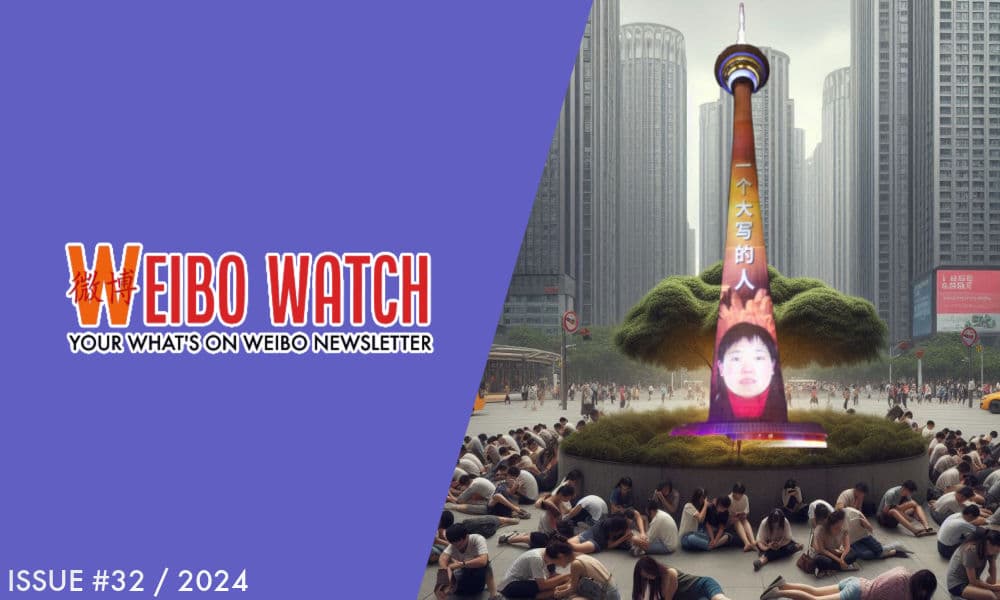
PREMIUM NEWSLETTER | ISSUE #32
This week’s newsletter:
◼︎ 1. Editor’s Note – Get up, stand up
◼︎ 2. What’s New and Noteworthy – A closer look at the featured stories
◼︎ 3. What’s Trending – Hot highlights
◼︎ 4. What’s Remarkable – Seeing little people
◼︎ 6. What’s Popular – Wild Child: missing in action
◼︎ 7. What’s Memorable – Bystander effect
◼︎ 8. Weibo Word of the Week – “City bu City”
Dear Reader,
Over the past few weeks, there has been a lot of discussion on Chinese social media about young people refusing to give up their seats for older people on the subway, sometimes leading to explosive situations.
On June 16, security was called when a young man on a Shenyang subway crumbled after an old man demanded that he’d give up his seat for him. In a video of the incident, which soon went viral, the young man can be heard screaming: “Are you giving me money? No? Then don’t bother me! I’m just happy to be sitting here. What’s wrong with me grabbing a seat?
Another subway incident went trending a week later. On June 24, a 65-year-old man started harassing a young woman on Beijing Subway Line 10 after she refused to give up his seat to him. The man became aggressive, started slapping the woman and put his cane in between her legs, trying to force her to stand up. The incident, which was filmed by other passengers, caused outrage on social media and the man was later detained by Beijing police.
A day later, in Wuhan, an elderly man and a young woman also got into an altercation that was caught on camera. After female passenger took the only available seat during morning rush hour on Line 2, the man reminded her that she should give up her seat out of respect for the elderly. “Why should I?” she asked: “I don’t owe you anything. I work overtime until 12:00 at night every day, and now you expect me to give up my seat during the morning rush hour?”
These incidents have sparked discussions about how people feel about these situations. In China, where respect for the elderly is deeply ingrained in the culture, should you give up your seat to the elderly on public transport because it is your duty, or is it just a personal choice? In an online poll held by Sina News, over 93% of respondents said they felt it was not their duty to give up their seat but a personal choice—a matter of courtesy.
“As long as you’re not sitting in a priority seat, you don’t have to give up your seat,” a top comment said. “It’s not easy being working class.” Many people echoed this sentiment, siding with the younger people who are facing their own tough struggles in China today. “I’d advise the elderly not to crowd public transport during the morning and evening rush hour,” another popular comment said, receiving thousands of likes.
These discussions signal a social shift: “When the topic comes up about young people not giving up their seats for the elderly, have you ever considered that these young people have been working all day? If you feel so strongly about it being your duty, how about you call a taxi for the elderly yourself?”
While many commenters expressed that people are not obliged to give up their seats to others, some, including pregnant women, complained about the overall reluctance of other passengers to give up their seats for them. “It feels like everybody is tired,” one Weibo user wrote.
Standing By
Another noteworthy discussion on Chinese social media recently was not about sitting down but about standing by. In a stabbing incident caught on camera by bystanders, a man locally known as “Bag-Clutching Brother” (夹包哥) was killed in the city of Songyuan in China’s Jilin province on June 30. His real name was Mr. Zhao, but he earned the nickname “Jiabaoge” (夹包哥, “Brother Clutch Bag”) for his eccentric square dancing while clutching a bag.
A video of the horrific incident shows Mr. Zhao happily dancing in a public square in Songyuan, with dozens of people present, when a man suddenly draws a knife and starts stabbing him. As the crowd watches on, the attack continues. Moments later, Mr. Zhao can be seen lying in a puddle of blood while still being attacked. Bystanders did not intervene. The attacker, a local drunk who did not even know “Brother Clutch Bag,” was detained by police. Zhao died of his injuries.
The incident caused a shock wave on social media. “They all stand in a circle and watch,” a typical comment said. “Not one of them stepped forward to help.” Some people called the onlookers “cold and detached” (“冷漠围观”).
While many suggest the onlookers are selfish and too preoccupied with filming to actually intervene, others suggested they were just scared to face the consequences of intervening.
There is a complex interplay of factors associated with the likelihood of people intervening when witnessing a crime or other emergency. Research points out that the higher the levels of fear among bystanders, the less likely they are to intervene. The more they perceive themselves as strong, the more likely they are to help. Additionally, the more people witnessing an emergency, the less personal responsibility is felt, reducing the chances of intervention.
As a victim, you might be more fortunate if just one person sees your predicament—and comes to your aid—than if a hundred people look on and do nothing.
Hu Youping
This issue perhaps also played a role in a third noteworthy topic that became a major trend recently, which I also wanted to mention here. It concerns the death and honoring of Ms Hu Youping (胡友平). Hu Youping, a 54-year-old school bus attendant, stepped in to help when a Japanese mother and child were attacked by a man with a knife at a school bus stop in Suzhou on June 24.
Hu was working that day when, around 4 pm, someone wielding a knife started attacking people at the bus stop near Xindi Center on Tayuan Road. As she rushed forward to stop the attacker, she was stabbed multiple times—one of the stabs hit her heart. On June 26, two days after the incident, Hu succumbed to her injuries.
The story of Hu Youping is remarkable on many levels. Not only was she brave, but she also intervened during a time when multiple stabbing incidents were making the news (also see: Jilin stabbings). Her courage became the focus of Chinese media reports about the Suzhou stabbing, diverting attention from the suspect’s motivations and discussions questioning China’s public safety. Adding to the story is that Hu protected a Japanese mother and child, which, in the context of Sino-Japanese tensions, reinforced her selflessness.
Hu’s face was suddenly everywhere. Netizens praised her kindness, and state media honored her bravery. As she officially received the title of “Model of Righteousness,” she was exemplified as embodying the kindness and courage of the Chinese people by local authorities. The Tianjin Radio and Television Tower even lit up in honor of Hu Youping, projecting her portrait on the side of the building.

Hu Youping is seen as a selfless heroine. Her story is not just propagated by official channels, it also resonates with the people. “People like Ms. Hu Youping and other heroes are remarkable, not only for their willingness to sacrifice themselves but also for inspiring those around them,” one Weibo blogger wrote.
Perhaps Hu Youping is the role model people need at this time, when so many stories about a lack of altruism, conflicting values, and moral crises are trending on social media. She was not necessarily an extraordinary person; she was a normal, kind-hearted and hard-working woman who would not stand by while seeing people in trouble.
However, while Hu Youping’s bravery is inspiring, her courage also serves as a cautionary tale. In one thread about the passive crowds watching Mr. Zhao get killed, commenters wrote: “Look what happened to Ms. Hu Youping. She got killed while bravely intervening, so who would dare to step in here?”
Her courage and ensuing death have ignited a realistic debate on what helping others may look like when confronting an armed attacker directly is not an option: “If someone is attacking with a knife and you are unarmed, your only option is to run. If you can help others to run with you, you are already a hero.”
In the end, Hu Youping triggers discussions on kindness, fearlessness, and doing what’s right. At a time when the social moral compass seems adrift, people like Hu help recalibrate it. Whether it means standing up or sitting down, stepping in or getting out, it’s always best to follow that personal moral compass regardless of what others do. Sometimes, that might mean sitting down when you need to rest, knowing that taking care of yourself is just as important. At other times, it means standing up when nobody else does, and rising not because it’s your duty, but because you know it’s the right thing to do.
Miranda Barnes and Ruixin Zhang have helped compile some of the topics mentioned in this week’s newsletter. As always, please do not hesitate to reach out if you’d like to share something you’ve spotted or share your ideas with me.
Best,
Manya Koetse
(@manyapan)
What’s New

Humble Prodigy or Deceptive Impostor? | It’s rare for a math competition to become the focus of nationwide attention in China. But since 17-year-old vocational school student Jiang Ping made it to the top 12 among contestants from prestigious universities worldwide, her humble background and outstanding achievement sparked debates and triggered rumors.

“Scared to Intervene” | In a shocking incident caught on camera, a well-known Songyuan resident nicknamed “Brother Clutch Bag” was tragically stabbed to death. On Weibo, people have reacted with disbelief.

Another One Bites the Dust | Li Shangfu allegedly “took advantage of his position to seek benefits for others” and received large sums of money.
What’s Trending
JUNE 26
🇺🇸 Biden vs Trump | Just like in the rest of the world, Biden and Trump’s presidential debate became a hot topic on Chinese social media. Chinese America watchers harshly criticized the debate, describing it as a race between a “madman and a senile patient.” Others perceived the overall energy and quality of the debate as indicative of troubled times for America and see the presidential campaign as a sign of Western democracy falling behind. Many commenters suggest that it does not really matter for China who becomes president, as both candidates are expected to adopt a tough stance on China. Nonetheless, there were various posts indicating a preference for Trump because he generates more memes and jokes on Chinese social media and is “more fun to watch.”
JUNE 29
🐼 From Sichuan to San Diego | They are the first set of pandas to make their way to the U.S. in 21 years: Yun Chuan (云川) and Xin Bao (鑫宝) safely arrived in San Diego on June 28 after a long flight from China. Their caretakers in Sichuan had to say goodbye to them for a loan period of at least ten years. On Chinese social media, many commenters expressed sadness about the pandas leaving China, wondering if their American adventure is really in their best interest.”
JUNE 30
🚀 Accidental Rocket | Was it a plane? Was it a meteor? Videos of an explosion in the hills near Gongyi City in Henan recently went viral (link). The huge impact was not caused by a meteor; it was a rocket. While performing a ground test, the Chinese rocket by space startup Space Pioneer (天兵科技) was accidentally launched and crashed near a residential area. There were no reports of casualties. A few days later, Space Pioneer sincerely apologized and promised that the company would compensate anyone who suffered property damage due to the test failure. The incident has sparked questions on why a private enterprise was able to test out rockets in Gongyi in the first place.
JULY 1
🏸 Zhang Zhijie Dies | On June 30, the young Chinese badminton player Zhang Zhijie (张志杰) collapsed and convulsed during a game in Indonesia. Videos of the incident (link) showed how it took about 40 seconds before medics arrived to attend to him. After being rushed to the hospital, the 17-year-old player from Jiaxing, Zhejiang, passed away. According to Indonesia’s badminton association, Zhang died due to sudden cardiac arrest. On Weibo, a hashtag about Zhang’s death garnered over 560 million views (#张志杰去世#) since late June. Zhang’s sister shared her grief and shock about her brother’s death on her Weibo account. Zhang’s mother was so overcome with grief that she had to be temporarily hospitalized earlier this week. Zhang’s family is now in Indonesia, seeking more clarity on his death and holding those responsible accountable.
JULY 2
🚗 Molly and Mr. Musk | “Hello Mr. Musk, I’m Molly from China. I have a question about your car. When I draw a picture, sometimes it will disappear like this. You see it? So can you fix it? Thank you.” Recently, a 7-year-old girl from Beijing named Molly recorded a video for Elon Musk, in which she complained in English about a bug in Tesla’s sketchpad: when adding a new stroke to her drawing, Molly found that previous strokes would sometimes disappear. In response, Musk replied to her on the X platform, “Sure.” The little exchange generated a lot of attention for Molly on Chinese social media, where the little girl was applauded for how she managed to address an issue with her drawing pad directly with Mr. Musk himself.
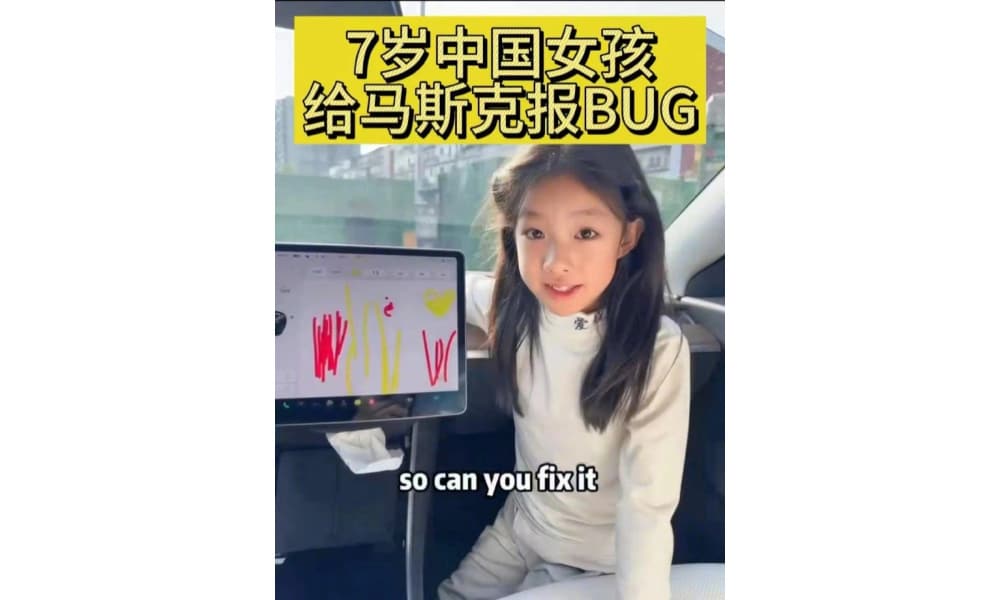
JULY 6
🌊 Dongting Floods | A dike of Dongting Lake in Yueyang, Hunan Province, burst on Friday afternoon, causing serious flooding in the area. What started as a 10-meter-wide breach eventually became a breach of approximately 225 meters (738 feet) wide. This flooding of China’s second-largest freshwater lake has already affected approximately 5,000 people, and around 3,000 people were relocated on Saturday. Efforts to seal the breach in the embankment in Huarong County are underway, with over 4700 people actively helping to control the flood.
JULY 7
📈 Peak in Death Rates | On Sunday, reports of China facing an imminent peak in death rates went trending on Weibo, where a related hashtag became one of the most-searched topics (#中国将迎来人口死亡高峰#). Chinese news outlet Jiemian News reported on a new study published in the latest issue of the Chinese magazine “Population Research” (人口研究), where researchers predict an unprecedented peak in death rates due to various factors, including China’s rapidly aging population, historical birth fluctuations, and increased longevity. As the aging population from the post-war mid-20th-century birth boom leads to a rapid rise in deaths, researchers emphasize the need to prepare for the societal impacts of this peak, including improved palliative care and better planning for funeral services. “Can we first fix the problem of post-graduate unemployment?” one top commenter wondered.
What’s Noteworthy

Do you remember when US Treasury Secretary Yellen had some supposed ‘magic mushrooms’ in Beijing? The mushroom dish she had at a local restaurant is called “jiànshǒuqīng” (见手青) in Chinese; it’s the Lanmaoa asiatica mushroom species that grows in China’s Yunnan region and is considered hallucinogenic if not prepared properly, causing visions that locals call “xiǎorénrén” (小人人), literally meaning seeing “tiny people.” The Chinese is similar to the English term “Lilliputian hallucinations” that refers to visual hallucinations which could also include seeing tiny humans.
The fact that Yellen had this dish actually made it more popular online in China, leading more people to order the mushrooms through online channels.
This week, one Chinese girl named Xiaolin who had ordered 500 grams of the mushrooms became a top trending topic online. She used them for her mushroom soup and added them to her noodles. She consumed all of the mushrooms within one day. Later that night, Xiaolin started feeling unwell. She started seeing numerous “tiny people” running around her house, and when the little figures tried to whisper in her ear and get into her bed, the terrified girl rushed to her friend’s house, who decided to take her to the hospital due to her incoherent speech and strange behavior. The girl was eventually hospitalized due to wild mushroom poisoning.
The story garnered 160 million views on Weibo (#女子吃1斤见手青后看见一屋人#), where many people are now more aware of the dangers of consuming wild mushrooms if not properly cooked. However, there are also many others who are only more curious now; they also want to see ‘little people’ walking around their house.

Meme comparing Vision Pro to the ‘magic’ jianshouqing mushroom: which surreal experience is better?
Some memes relating to this topic suggest that having “jiànshǒuqīng” is a cheaper and more interactive VR experience than getting the Apple Vision Pro. It surely isn’t something that authorities would like to see more people experiment with: a vlogger who tried out some raw mushrooms on her livestream was immediately shut down this week.
What’s Popular

The highly anticipated Chinese film Wild Child (野孩子) was scheduled for a nationwide premiere on July 10. Earlier this year, Wild Child won the Weibo award for the most-anticipated movie of the year. Starring the immensely popular former TFBoys leader Wang Junkai (also known as Karry Wang 王俊凯, 1999), the film had generated significant excitement among Chinese movie-goers. However, this week, the film distributor abruptly announced the cancellation of its release, citing alleged post-production delays. The cancellation, which quickly trended and sparked widespread discussion on Chinese social media, was particularly surprising as tickets were already being sold in the presale box office.
Directed by Yin Ruoxin (殷若昕), Wild Child is based on a true story about two boys from a poor background who struggle to get by. The film addresses the theme of “children living in difficulty” (困境儿童), depicting the lives of children growing up in poverty. The two boys, one a thief and the other an orphan, are united by fate and bond as brothers as they face their challenges together.
Why was the movie canceled so close to its premiere date? Was the withdrawal a purely commercial decision driven by poor presale figures, as suggested in a recent column by People’s Daily, or were there political motivations involved? Could its theme be misaligned with the upcoming Party’s third plenary session? Or is the portrayal of children facing social difficulties simply too sensitive? While the true reasons remain unclear, many fans are hopeful they will still have the opportunity to see the film.
What’s Memorable

For this pick from the archive, and in the context of recent discussions on bystanders not intervening, we revisit a 2015 article about a young Chinese student who helped an elderly lady who had fallen on the street, only to be held liable for her injuries. Stories like these are often cited to explain why people hesitate to help someone in need.
Weibo Word of the Week

“City or not” | Our Weibo phrase of the week is City bu City a (City不City啊), translated as “City or not?”, a phrase that has recently taken the Chinese internet by storm.
The phrase first became popular thanks to American influencer Paul Mike Ashton, nicknamed “Bao Bao Xiong” (保保熊, Baby Bear), who runs a Chinese-language account on Douyin. On his channel, Ashton shares humorous snippets about his life in China, where he works as an entertainer and tour guide.
In one video from April this year, Ashton posted a clip in which he cycles through the city like a Shanghai ‘city girl’ who often mixes Chinese and English words, calling himself “very city” (“我是好city”). He says: “I’m so city, a city girl. It’s so cool, breezy. Life in the city is so good, I feel so free.”
Ashton later began incorporating this phrase more frequently in his videos, often involving his sister, who also speaks Chinese in these humorous exchanges. Walking on the Shanghai Bund, the brother and sister describe Shanghai as “so city” (“好city啊”). While walking on the Great Wall, Bao Bao asks his sister if it’s “city or not” (it’s not).
In other videos in which the two are traveling through China, Ashton repeatedly asks his younger sister if certain things are “city or not,” to which she usually responds humorously: “It’s very city.”
In this context, “city” has evolved from a noun into a quirky adjective, describing something that embodies the essence of urban life; something that is ‘city’ is metropolitan, lively, and modern. It’s very tongue-in-cheek and also serves as a playful commentary on how young Chinese people often mix Chinese and English words to sound more sophisticated and trendy.
This phenomenon sparked the ‘city or not’ meme, which even reached the Foreign Ministry this week when spokesperson Mao Ning was asked about it. She responded that she had heard about the new use of the phrase and that it is a positive sign of foreigners enjoying life in China.
Chinese authorities and state media have also jumped on this trend to promote tourism. By now, the meme has been imitated and adapted by various local tourism departments. Ashton himself has encouraged foreigners to come and experience Chinese culture (and its very ‘city’ city life), further boosting its popularity.
This is an on-site version of the Weibo Watch newsletter by What’s on Weibo. Missed last week’s newsletter? Find it here. If you are already subscribed to What’s on Weibo but are not yet receiving this newsletter in your inbox, please contact us directly to let us know.
Popular Reads
-

 China Insight3 months ago
China Insight3 months agoThe Tragic Story of “Fat Cat”: How a Chinese Gamer’s Suicide Went Viral
-

 China Music4 months ago
China Music4 months agoThe Chinese Viral TikTok Song Explained (No, It’s Not About Samsung)
-

 China Digital10 months ago
China Digital10 months agoToo Sexy for Weibo? Online Discussions on the Concept of ‘Cābiān’
-

 China Arts & Entertainment12 months ago
China Arts & Entertainment12 months agoBehind 8 Billion Streams: Who is Dao Lang Cursing in the Chinese Hit Song ‘Luocha Kingdom’?






